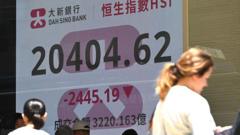**Asian economies are grappling with the implications of escalating tariffs imposed by the US, with fears of a potential recession looming large.**
**Asian Stock Markets Experience Historic Decline Amid Trade War Fears**

**Asian Stock Markets Experience Historic Decline Amid Trade War Fears**
**Massive sell-offs in major Asian markets reflect investor concerns over the impact of new US tariffs.**
Asian stock markets faced unprecedented declines on Monday, marking the steepest drops in decades, following the announcement of new tariffs by US President Donald Trump. From Shanghai to Tokyo and beyond, indices tumbled as market sentiments soured further due to fears of an impending global trade war that could jeopardize economic stability.
The Shanghai Composite Index plummeted more than 8% at one point, while Hong Kong’s Hang Seng index experienced a staggering drop of over 13%. Japan's Nikkei 225 was not spared either, closing down by 7.8%. Analysts condemned the situation, with one referring to the abyssal declines as a "bloodbath" during a BBC interview. Meanwhile, European markets were not left unscathed, starting early trading with significant losses, especially within the banking and defense sectors.
Markets have been reeling from Trump's announcement of tariffs ranging from 10% to an alarming 46% on imports from several countries. This move is particularly devastating for manufacturing hubs across Asia that heavily depend on US exports encompassing a wide array of goods, from textiles to automobiles. Esteemed allies such as Japan and South Korea are facing tariffs of up to 26%, while emerging economies like Vietnam are bracing for rates as high as 46%. Other countries, including Cambodia and Thailand, have also been impacted, facing respective tariffs of 49% and 36%, while China anticipates a staggering total of 54%.
Economic experts caution that Asia is disproportionately bearing the brunt of these hikes. "The reality of a new regime of higher tariffs is settled," stressed Qian Wang, chief economist for the Asia Pacific at Vanguard. The ongoing turmoil is heightened by anxieties of a US recession that could further mitigate Asian export performance and exacerbate economic woes in the region.
As regional giants like mainland China, Hong Kong, and Taiwan struggled, Taiwan’s Weighted Index recorded a record 9.7% drop, while Australia’s ASX 200 and South Korea’s Kospi indexes fell by 4.2% and 5.6% respectively. The Hang Seng's closing at a 13.22% decrease is the most significant drop since the 2008 financial crisis.
Julia Lee from FTSE Russell indicated that rising tariffs are influencing inflation expectations, contributing to recession concerns. Goldman Sachs has adjusted its forecast, now estimating a 45% chance of recession within the US over the next year. Other firm forecasts, such as JPMorgan, have similarly projected a 60% likelihood of economic downturns on both domestic and global scales.
Various countries, including Bangladesh and Vietnam, have become increasingly dependent on US exports, leading to significant worries about the adverse effects of the newly introduced tariffs. Notably, Bangladesh's garment industry, which ships $8.4 billion in products to the US annually, is particularly vulnerable with a new 37% tariff looming over it.
Experts like Frank Lavin, a former US trade undersecretary, warn that Asia’s heavy export reliance on the US market compounds the economic risks, suggesting the region will face disproportionate repercussions. The unfolding events indicate a potential continuation of the global stock market rout, as US futures hint at further losses ahead.
The turbulence doesn't stop at Asian borders. US markets have already reacted sharply, with the S&P 500 index posting a nearly 6% loss, culminating in its worst weekly performance since 2020. The UK and European exchanges have similarly faced severe declines, highlighting the widespread impact of this escalating trade conflict.
The Shanghai Composite Index plummeted more than 8% at one point, while Hong Kong’s Hang Seng index experienced a staggering drop of over 13%. Japan's Nikkei 225 was not spared either, closing down by 7.8%. Analysts condemned the situation, with one referring to the abyssal declines as a "bloodbath" during a BBC interview. Meanwhile, European markets were not left unscathed, starting early trading with significant losses, especially within the banking and defense sectors.
Markets have been reeling from Trump's announcement of tariffs ranging from 10% to an alarming 46% on imports from several countries. This move is particularly devastating for manufacturing hubs across Asia that heavily depend on US exports encompassing a wide array of goods, from textiles to automobiles. Esteemed allies such as Japan and South Korea are facing tariffs of up to 26%, while emerging economies like Vietnam are bracing for rates as high as 46%. Other countries, including Cambodia and Thailand, have also been impacted, facing respective tariffs of 49% and 36%, while China anticipates a staggering total of 54%.
Economic experts caution that Asia is disproportionately bearing the brunt of these hikes. "The reality of a new regime of higher tariffs is settled," stressed Qian Wang, chief economist for the Asia Pacific at Vanguard. The ongoing turmoil is heightened by anxieties of a US recession that could further mitigate Asian export performance and exacerbate economic woes in the region.
As regional giants like mainland China, Hong Kong, and Taiwan struggled, Taiwan’s Weighted Index recorded a record 9.7% drop, while Australia’s ASX 200 and South Korea’s Kospi indexes fell by 4.2% and 5.6% respectively. The Hang Seng's closing at a 13.22% decrease is the most significant drop since the 2008 financial crisis.
Julia Lee from FTSE Russell indicated that rising tariffs are influencing inflation expectations, contributing to recession concerns. Goldman Sachs has adjusted its forecast, now estimating a 45% chance of recession within the US over the next year. Other firm forecasts, such as JPMorgan, have similarly projected a 60% likelihood of economic downturns on both domestic and global scales.
Various countries, including Bangladesh and Vietnam, have become increasingly dependent on US exports, leading to significant worries about the adverse effects of the newly introduced tariffs. Notably, Bangladesh's garment industry, which ships $8.4 billion in products to the US annually, is particularly vulnerable with a new 37% tariff looming over it.
Experts like Frank Lavin, a former US trade undersecretary, warn that Asia’s heavy export reliance on the US market compounds the economic risks, suggesting the region will face disproportionate repercussions. The unfolding events indicate a potential continuation of the global stock market rout, as US futures hint at further losses ahead.
The turbulence doesn't stop at Asian borders. US markets have already reacted sharply, with the S&P 500 index posting a nearly 6% loss, culminating in its worst weekly performance since 2020. The UK and European exchanges have similarly faced severe declines, highlighting the widespread impact of this escalating trade conflict.




















